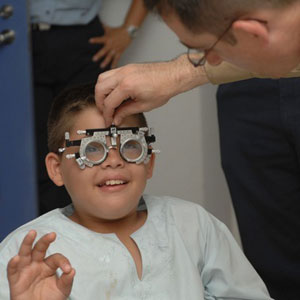Optometrist
Tasks & duties

Optometrists may do some or all of the following:
-
examine and test clients' eyes and vision
-
diagnose, treat and manage diseases and disorders of the visual system
-
prescribe ocular (visual) therapy medicines for diseases such as conjunctivitis
-
refer clients with eye and neurological diseases to specialists
-
prescribe and fit glasses, contact lenses and other visual aids
-
advise clients on eye exercises
-
sell eyewear and eye care products
-
help clients choose frames
-
speak at conferences and teach optometry
-
advise on computer set-up and lighting in workplaces
-
run their own businesses
Specialisations
Optometrists can specialise in a range of areas including contact lenses, diabetic screening, geriatric vision and children's eye care.
Skills & knowledge

Optometrists need to have:
-
in-depth knowledge of eye problems and diseases
-
knowledge of the structure of the eye and how vision works
-
an understanding of biology, physiology, physics and chemistry
-
knowledge of lenses, contact lenses and frames for glasses
-
up-to-date knowledge of new research and information
-
technical skills to examine eyes and operate examination equipment
-
skill in interpreting eye examination results
-
problem-solving and diagnostic skills
-
communication and listening skills
-
business management skills if they have their own practice
Entry requirements
To become an optometrist, you need to have completed the four-year Bachelor of Optometry (BOptom), which is offered at the University of Auckland.
Secondary education
A tertiary entrance qualification is required to enter further training, and useful subjects include biology, chemistry, physics, maths and English.
Tertiary education
To enter the Bachelor of Optometry you need to complete the first year of a Bachelor of Health Sciences.
Training on the job
Optometrists are required to attend continuing education courses to remain registered. To provide the best care for their clients, optometrists must ensure they keep up to date with advances in eye care technology, procedures and treatment, and correction options.
Registration
Qualified optometrists must register with the Optometrists and Dispensing Opticians Board to be able to practise in New Zealand. After they are registered, they are issued an Annual Practising Certificate. This must be renewed each year. Optometrists registered with the board can apply for membership with the New Zealand Association of Optometrists (NZAO).
Useful experience
Useful experience for optometrists includes:
-
work in the health sector
-
business management experience
-
work for a senior optometrist
-
scientific or medical research
A current first aid certificate may be useful.
Related courses
Optometry
For more information, please refer to Career Services.
Document Actions
